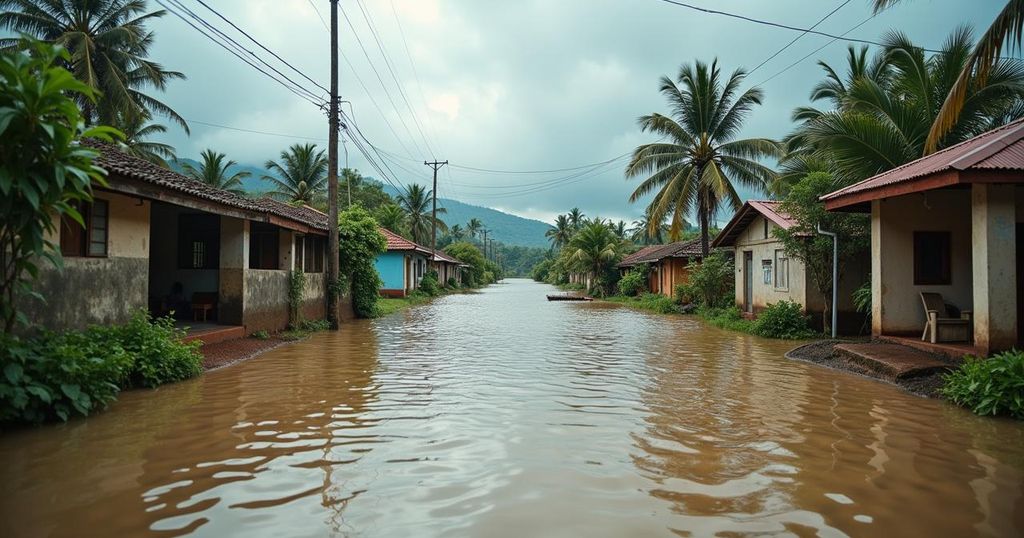Catastrophic Flooding in West Africa: Climate Change’s Toll on Vulnerable Nations
West and Central Africa, notably Nigeria, face devastating floods that have resulted in over 1,000 fatalities and affect more than 4 million individuals. These events are deeply intertwined with climate change, which has altered weather patterns and exacerbated infrastructural vulnerabilities. Reports indicate significant food and shelter shortages in affected regions, highlighting the urgent need for both immediate humanitarian assistance and long-term adaptation strategies. Experts call for better infrastructure and international cooperation to prevent future disasters.
In recent weeks, West and Central Africa have faced unprecedented flooding, resulting in significant human distress and major disruptions across multiple nations. This catastrophic event, which has tragically claimed over 1,000 lives, has occurred amid a broader context of climate change and resource inadequacy in regions such as Nigeria, Mali, Senegal, and Chad, which are among the most vulnerable globally to the impacts of climate change. The alarming figures indicate that more than 4 million individuals have been affected by these floods. An interview conducted by Steve Curwood with Nana Mohammed, a graduate student and intern from the NYU Science, Health and Environmental Reporting Program, sheds light on this crisis. Local reports indicate that Maiduguri, Nigeria, is particularly devastated, with significant numbers of residents experiencing food and shelter shortages. Further accounts from Isma’il Alfa Abdulrahim, a journalist from Maiduguri, detail the dire circumstances faced by families, where individuals, including children, found themselves trapped as homes were submerged. Furthermore, climatologist Dr. Vincent Nduka Ojeh emphasised the extraordinary nature of this flooding event due to extreme weather patterns, resulting from climate change, which has intensified rainfall following a prolonged drought. Despite the clear link between these weather changes and climate disruption, there remains a disconnect in public understanding, with some still viewing climate phenomena as acts of God rather than consequences of anthropogenic climate change. Moreover, infrastructural vulnerabilities significantly exacerbated the effects of the flood, particularly noting the collapse of Alau Dam, which officials had long been warned needed repairs. The cumulative impact of poor governmental planning, corruption, and inadequate resources further hindered effective responses to this disaster. Ojeh argues that developing nations like Nigeria must craft concrete adaptation strategies while seeking support from wealthier countries, which have pledged limited resources in comparison to the needs at hand. As recovery efforts commence, it is crucial for Nigeria to enhance its infrastructure to mitigate future disasters, prioritising improved drainage systems and flood defenses. However, immediate action is necessary to provide safety and shelter for those currently affected by the crisis, as many are still displaced and in desperate need of assistance. Ultimately, this flooding disaster encapsulates the urgent need for cohesive responses to climate change impacts, detailed planning for infrastructure resilience, and international cooperation for resource allocation and support.
The recent flooding in West and Central Africa, particularly in countries like Nigeria and Mali, represents a critical environmental disaster exacerbated by climate change. As global weather patterns continue to shift, vulnerable regions with frail infrastructures are increasingly at risk of catastrophic events. The current crisis has not only resulted in significant loss of life but has also disrupted millions of lives, triggering many to confront the compounded challenges of climate impacts and inadequate governmental responses. This situation highlights the urgent need for both local adaptation measures and international support for developing nations grappling with the effects of climate disruption and extreme weather conditions. Past incidences of environmental crises in these regions, such as those stemming from both climatic and human-induced factors, underscore an ongoing struggle against vulnerabilities that are further magnified by poverty and inadequate infrastructure. Responding effectively to such situations is crucial for safeguarding lives and enhancing community resilience in the face of future disasters.
The flooding crisis in West and Central Africa serves as a poignant reminder of the profound effects of climate change on vulnerable communities. With over 1,000 lives lost and millions displaced, the urgency of addressing the systemic flaws in infrastructure and governance becomes increasingly apparent. As local communities like those in Maiduguri battle the immediate consequences of flooding, there is a pressing need for global support and a commitment to improving resilience against future climate events. Ensuring that nations are equipped to manage such disasters is not only a moral obligation but an essential step towards sustainable development in the face of climate change.
Original Source: insideclimatenews.org




Post Comment